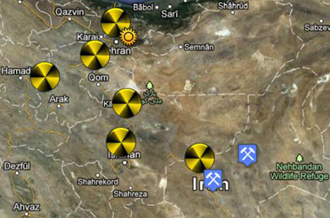Fresh Iran nuclear talks set for Moscow
Catherine Ashton, P5+1 lead negotiator, announces further discussions next month as Baghdad meeting ends without a deal.

Iran and world powers will meet in Moscow next month for more talks to try solve a longstanding dispute about Iran’s nuclear energy programme, Catherine Ashton, the European Union foreign-policy chief, has said.
Speaking in Baghdad on Thursday, the last of two days of discussions between envoys from Iran and six leading powers to try to defuse Western fears of a covert Iranian effort to develop nuclear bombs, Ashton said it was clear both sides wanted progress and had some common ground, but they also had significant differences.
“We will maintain intensive contacts with our Iranian counterparts to prepare a further meeting in Moscow,” she announced in the Iraqi capital.
The Moscow meeting is set to take place on June 18 and 19.
Ashton, who leads the negotiations for the P5+1 (the five permanent Security Council members plus Germany), said the bloc wanted practical steps from Iran to address concerns over its nuclear work.
Chief among such concerns is Iran’s ability to enrich uranium to a fissile purity of 20 per cent. That is the nuclear advance most worrying to the West since it hurdles technical obstacles to reaching 90 per cent, or bomb-grade, enrichment.
Iran says it will not exceed 20 per cent and the material will be made into fuel for a research reactor.
“Iran declared its readiness to address the issue of 20 per cent enrichment and came with its own five point plan,
including their assertion that we recognise their right to enrichment,” Ashton said.
No deal
The Baghdad talks failed to reach any deal, despite reports indicating that the P1+5 had made several offers if Iran would halt enrichment, including fuel plates for a reactor producing medical isotopes, relaxing restrictions on aircraft parts and nuclear safety assistance.
But this falls short of the lifting of the whole raft of UN Security Council and unilateral Western sanctions that have been directed at Iran for years.
Iran is threatened with an EU oil embargo, due to take full effect from July 1, which will ensure EU firms from heading crude tankers to countries such as India, South Korea and Japan, all major buyers of Iran’s oil.
| INTERACTIVE | |||
|
Saeed Jalili, Iran’s chief negotiator, emphasised that Iran had the right to continue to enrich uranium.
“Of the main topics in using peaceful nuclear energy is the topic of having the nuclear fuel cycle and enrichment. We
emphasise this right,” he said in Baghdad on Thursday.
“This is an undeniable right of the Iranian nation … especially the right to enrich uranium.”
Earlier, an Iranian delegation official had complained that world powers were hindering the talks in Baghdad, creating a “difficult atmosphere”.
“We believe the reason P5+1 is not able to reach a result is America,” the official told Reuters news agency on condition of anonymity.
“[P5+1] came to Baghdad without a clear mandate so we think the atmosphere is difficult.”
Iran insists its nuclear programme is peaceful, but Western powers suspect it is masking attempts to join the elite club of nations with nuclear weapons.
The powers’ overall goal is an Iranian agreement to curb uranium enrichment in a transparent, verifiable way to ensure it is for peaceful purposes only.
Iran’s priority is to secure an end to sanctions isolating the country and damaging its economy.
The Baghdad talks were the second round in the latest series between the P5+1 and Iran over its controversial nuclear programme, with earlier negotiations held in Istanbul, Turkey, last month.
